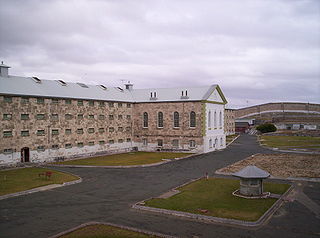Related Research Articles
In criminal law, mens rea is the mental state of a defendant who is accused of committing a crime. In common law jurisdictions, most crimes require proof both of mens rea and actus reus before the defendant can be found guilty.

Criminal justice is the delivery of justice to those who have been accused of committing crimes. The criminal justice system is a series of government agencies and institutions. Goals include the rehabilitation of offenders, preventing other crimes, and moral support for victims. The primary institutions of the criminal justice system are the police, prosecution and defense lawyers, the courts and the prisons system.
Legalization is the process of removing a legal prohibition against something which is currently not legal.

Parole is a form of early release of a prison inmate where the prisoner agrees to abide by behavioral conditions, including checking-in with their designated parole officers, or else they may be rearrested and returned to prison.
Criminal psychology, also referred to as criminological psychology, is the study of the views, thoughts, intentions, actions and reactions of criminals and suspects. It is a subfield of criminology and applied psychology.

Recidivism is the act of a person repeating an undesirable behavior after they have experienced negative consequences of that behavior, or have been trained to extinguish it. Recidivism is also used to refer to the percentage of former prisoners who are rearrested for a similar offense.

Criminalization or criminalisation, in criminology, is "the process by which behaviors and individuals are transformed into crime and criminals". Previously legal acts may be transformed into crimes by legislation or judicial decision. However, there is usually a formal presumption in the rules of statutory interpretation against the retrospective application of laws, and only the use of express words by the legislature may rebut this presumption. The power of judges to make new law and retrospectively criminalise behaviour is also discouraged. In a less overt way, where laws have not been strictly enforced, the acts prohibited by those laws may also undergo de facto criminalization through more effective or committed legal enforcement. The process of criminalization takes place through societal institutions including schools, the family, and the criminal justice system.

In criminology, public-order crime is defined by Siegel (2004) as "crime which involves acts that interfere with the operations of society and the ability of people to function efficiently", i.e., it is behaviour that has been labelled criminal because it is contrary to shared norms, social values, and customs. Robertson (1989:123) maintains a crime is nothing more than "an act that contravenes a law". Generally speaking, deviancy is criminalized when it is too disruptive and has proved uncontrollable through informal sanctions.
Manslaughter is a common law legal term for homicide considered by law as less culpable than murder. The distinction between murder and manslaughter is sometimes said to have first been made by the ancient Athenian lawmaker Draco in the 7th century BC.

English criminal law concerns offences, their prevention and the consequences, in England and Wales. Criminal conduct is considered to be a wrong against the whole of a community, rather than just the private individuals affected. The state, in addition to certain international organisations, has responsibility for crime prevention, for bringing the culprits to justice, and for dealing with convicted offenders. The police, the criminal courts and prisons are all publicly funded services, though the main focus of criminal law concerns the role of the courts, how they apply criminal statutes and common law, and why some forms of behaviour are considered criminal. The fundamentals of a crime are a guilty act and a guilty mental state. The traditional view is that moral culpability requires that a defendant should have recognised or intended that they were acting wrongly, although in modern regulation a large number of offences relating to road traffic, environmental damage, financial services and corporations, create strict liability that can be proven simply by the guilty act.

Incapacitation in the context of criminal sentencing philosophy is one of the functions of punishment. It involves capital punishment, sending an offender to prison, or possibly restricting their freedom in the community, to protect society and prevent that person from committing further crimes. Incarceration, as the primary mechanism for incapacitation, is also used as to try to deter future offending.

Drug liberalization is a drug policy process of decriminalizing or legalizing the use or sale of prohibited drugs. Variations of drug liberalization include: drug legalization, drug re-legalization and drug decriminalization. Proponents of drug liberalization may favor a regulatory regime for the production, marketing, and distribution of some or all currently illegal drugs in a manner analogous to that for alcohol, caffeine and tobacco.

Race in the United States criminal justice system refers to the unique experiences and disparities in the United States in regard to the policing and prosecuting of various races. There have been different outcomes for different racial groups in convicting and sentencing felons in the United States criminal justice system. Although prior arrests and criminal history is also a factor. Experts and analysts have debated the relative importance of different factors that have led to these disparities.
Marsy's Law, the California Victims' Bill of Rights Act of 2008, enacted by voters as Proposition 9 through the initiative process in the November 2008 general election, is an amendment to the state's constitution and certain penal code sections. The act protects and expands the legal rights of victims of crime to include 17 rights in the judicial process, including the right to legal standing, protection from the defendant, notification of all court proceedings, and restitution, as well as granting parole boards far greater powers to deny inmates parole. Critics allege that the law unconstitutionally restricts defendant's rights by allowing prosecutors to withhold exculpatory evidence under certain circumstances, and harms victims by restricting their rights to discovery, depositions, and interviews. Passage of this law in California led to the passage of similar laws in Florida, Georgia, Illinois, Kentucky, Nevada, North Carolina, Oklahoma, Ohio and Wisconsin, and efforts to pass similar laws in Hawaii, Iowa, Montana, Idaho, South Dakota, and Pennsylvania. In November 2017, Marsy's Law was found to be unconstitutional and void in its entirety by the Supreme Court of Montana for violating that state's procedure for amending the Montana Constitution. The Pennsylvania Supreme Court reached the same conclusion as Montana under its own state constitution in 2021.

Punishment in Australia arises when an individual has been accused or convicted of breaking the law through the Australian criminal justice system. Australia uses prisons, as well as community corrections. When awaiting trial, prisoners may be kept in specialised remand centres or within other prisons.

The Manhattan Institute for Policy Research is an American conservative think tank focused on domestic policy and urban affairs. The institute's focus covers a wide variety of issues including healthcare, higher education, public housing, prisoner reentry, and policing. It was established in Manhattan in 1978 by Antony Fisher and William J. Casey.

Criminal justice reform seeks to address structural issues in criminal justice systems such as racial profiling, police brutality, overcriminalization, mass incarceration, and recidivism. Reforms can take place at any point where the criminal justice system intervenes in citizens’ lives, including lawmaking, policing, sentencing and incarceration. Criminal justice reform can also address the collateral consequences of conviction, including disenfranchisement or lack of access to housing or employment, that may restrict the rights of individuals with criminal records.
Criminal justice reform seeks to address structural issues in criminal justice systems such as racial profiling, police brutality, overcriminalization, mass incarceration, and recidivism. Criminal justice reform can take place at any point where the criminal justice system intervenes in citizens’ lives, including lawmaking, policing, and sentencing.

Decarceration in the United States involves government policies and community campaigns aimed at reducing the number of people held in custody or custodial supervision. Decarceration, the opposite of incarceration, also entails reducing the rate of imprisonment at the federal, state and municipal level. As of 2019, the US was home to 5% of the global population but 25% of its prisoners. Until the COVID-19 pandemic, the U.S. possessed the world's highest incarceration rate: 655 inmates for every 100,000 people, enough inmates to equal the populations of Philadelphia or Houston. The COVID-19 pandemic has reinvigorated the discussion surrounding decarceration as the spread of the virus poses a threat to the health of those incarcerated in prisons and detention centers where the ability to properly socially distance is limited. As a result of the push for decarceration in the wake of the pandemic, as of 2022, the incarceration rate in the United States declined to 505 per 100,000, resulting in the United States no longer having the highest incarceration rate in the world, but still remaining in the top five.
Roderic Broadhurst is a criminal justice practitioner, academic, and author. He is an Emeritus Professor at the School of Regulation and Global Governance (RegNet) and Fellow of the Research School of Asian and the Pacific at the Australian National University (ANU).
References
- ↑ Koch, Charles G.; Holden, Mark V. (January 2015). "The Overcriminalization of America". Politico.
- ↑ "Most prisoners per capita by country 2023". Statista.
- ↑ Podgor, Ellen S. (2020). "The Dichotomy Between Overcriminalization and Underregulation". SSRN Electronic Journal. doi:10.2139/ssrn.3739440. ISSN 1556-5068.
- ↑ Smith, Stephen F. "Symposium on Overcoming Overcriminalization". Journal of Criminal Law and Criminology. 102 (537).
- ↑ Welty, Jeff (2014). "Overcriminalization in North Carolina". North Carolina Law Review. 92 (6).
- ↑ Kamensky, Dmitriy (2016). "American Peanuts V. Ukrainian Cigarettes: Dangers of White-Collar Overcriminalization and Undercriminalization". SSRN Electronic Journal. doi:10.2139/ssrn.2805086. ISSN 1556-5068.
- ↑ Levin, Benjamin (2019). "Criminal Law: Mens Rea Reform and its Discontents". Journal of Criminal Law & Criminology. 109 (491) – via Nexis Uni.
- ↑ "Mens Rea and Overcriminalization | Nolan Center for Justice". conservativejusticereform.org. Retrieved 2023-12-08.
- ↑ "Overcriminalizing the Old North State: A Primer and Possible Reforms for North Carolina - Manhattan Institute". 24 August 2015.
- ↑ "Overcriminalizing the Wolverine State: A Primer and Possible Reforms for Michigan - Manhattan Institute". 24 August 2015.
- ↑ "'Overcriminalization' a Problem in South Carolina - Manhattan Institute". 19 January 2016.
- ↑ "Overcriminalizing the North Star State: A Primer and Possible Reforms for Minnesota - Manhattan Institute". 22 February 2016.
- ↑ "In Reforming Oklahoma Criminal Justice, Don't Forget Overcriminalization - Manhattan Institute". 17 February 2017.
- ↑ Dieterle, C. Jarrett (February 24, 2017). "Gorsuch v. Over-Criminalization".
- ↑ Criminal Liability in Regulatory Contexts (PDF) (Report). Vol. 195. Law Commission of England and Wales. 2010.
- ↑ F Leverick; J Chalmers (2015). "Is Formal Criminalisation Really on the Rise? Evidence from the 1950s". Criminal Law Review: 177.